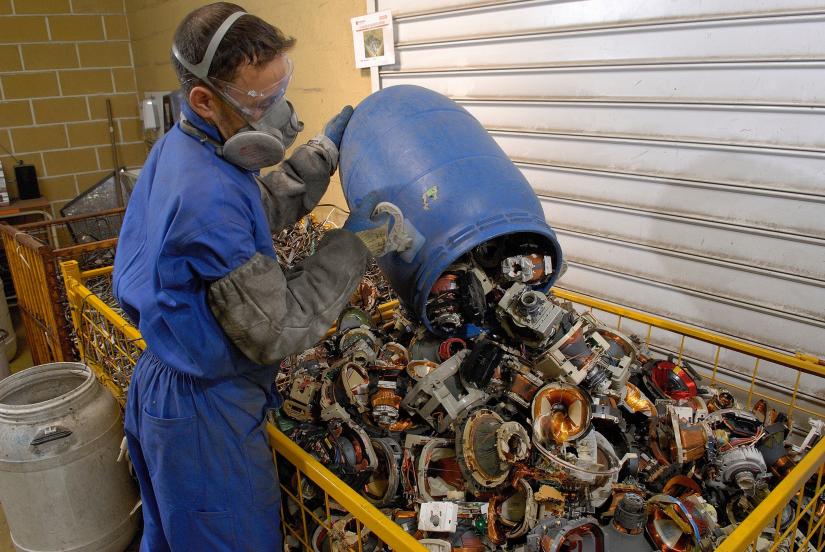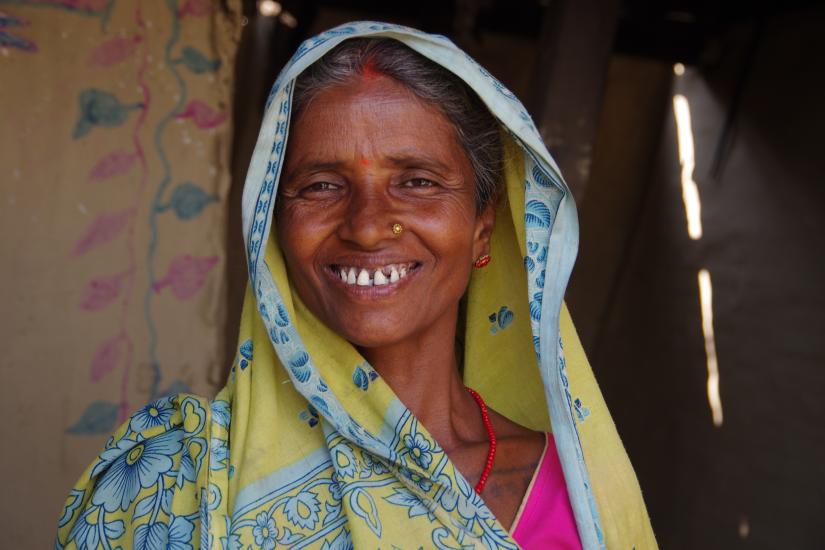ISF general scholarships
Our general scholarships cover tuition costs and provide a living allowance. They are awarded through a competitive process to top-ranked applicants who show academic excellence and alignment with ISF's approach to research. When you apply to study at ISF you can indicate if you wish to be considered for a scholarship.
While we welcome applicants with any research topics aligned with ISF’s mission and objectives, we are particularly interested in topics that relate to the priorities of our research programs. ISF’s current research priorities are outlined below.
For submission deadlines and details of how to express your interest in studying at ISF, please visit our How to Apply page.
Energy
Net Zero and Nationally Determined Contributions (NDCs)
100% Renewable Energy Based Net-Zero and Nationally Determined Contributions (NDC).
This area of our expertise focuses on the evolution of energy infrastructure as we transition to 100% renewable energy.
We help our clients to consider the future of energy by engaging in modelling and scenario development (for example: EV, PV grid integration, IoT, prosumers, business models, systems), and we seek to answer pressing questions such as:
- In an environment where renewable energy can deliver electricity, heat, gas, or hydrogen, how can we optimise interactions between our electricity, gas and water infrastructure to accelerate the transition to a zero-carbon economy?
- How can developing countries with low electricity access leapfrog fossil fuels for 100 % renewable energy access?
- What business models are needed to ensure positive community outcomes when looking at 100% renewable energy at the fringe of the grid?
- How will large-scale transport electrification impact the electricity system?
- What are the limits of local energy – how far can local or ‘distributed’ solutions reach?
- What are the energy infrastructure implications if Australia was to become a major renewable energy exporter?
Customer Energy Innovation
The challenge of achieving a successful energy transition requires both transformations in technological, economic, market, social, business models, and political systems. We invite PhD students who are interested in exploring how energy innovation can support a just and sustainable transition for households, businesses, and communities.
This could be well-suited for those with a wide variety of backgrounds (academic or professional) including social and behavioural science, technology and engineering, architecture, buildings, design, data science, economics, energy, or environmental science.
Possible topics include (but are not limited to):
- Electric vehicle integration for homes, businesses, and the grid
- Demand flexibility for homes and businesses
- Home energy upgrades at scale
- Net zero pathways for precincts
- Microgrids and community-scale batteries
- Power systems planning and operation
- DER/CER modelling and optimisation in power systems
- AI and machine learning applications in power systems
- Electricity market design and energy economics
Energy Jobs and Fairness
- Modelling demand for employment in the renewable energy transition.
- Investigating energy jobs and skills policy.
- Exploring the linkage between energy supply-chains, local provision and industry policy.
- First Nations and clean energy.
- What role does energy equity and fuel poverty play in an Australian context?
- How can developing countries with low electricity access leapfrog fossil fuels for 100% renewable energy access?
- What business models are needed to ensure positive community outcomes when looking at 100% renewable energy at the fringe of the grid?
- How can we incorporate carbon emissions from agriculture/food production into a carbon budget?
- How can we support regional innovation ecosystems to retain value locally and improve resilience co-benefits?
- How can grassroots community participation be embedded in clean energy business models to improve equity outcomes and social licence?
- What new institutional models are needed to optimise societal value creation in energy supply chains?
Supervisors Dr Ibrahim Ibrahim, Dr Chris Briggs, Dr Scott Dwyer, Dr Sven Teske
Water
Valuing saved water; improving the economic evaluation of water efficiency initiatives
This project springs from the observations of many in the industry that investment in managing water demand in Australia is dramatically under-represented compared to our investment in managing supply. To address this issue, the research project will explore the economics of urban water efficiency in depth. It will explore the full range of benefits that could arise due to urban water efficiency initiatives and how these might be valued, in comparison to alternatives that increase water supply. In particular it will consider how the value of saved water varies over space and time: with location across a precinct and a city; during periods of drought; on hot days; whether recycled or rain water is being saved; and when externality and intrinsic values are considered. It will also consider what forms of economic and financial analyses are appropriate for parties considering water efficiency initiatives and how the economics of water efficiency might improve in practice to account for the heterogeneity that exists.
Examining the equity of urban greening and cooling policy and outcomes
Heatwaves have killed more Australians than any other extreme weather event. In NSW heat related deaths are rising and heat is included on the state risk register. Water sensitive urban design enables water is retained in the landscape for greening, cooling and beautification. However, decision makers responsible for allocating scarce water resources are often required to demonstrate customer willingness to pay for these so called ‘discretionary’ greening and cooling outcomes. Studies examining tree cover and cooling in the US have identified that tree coverage and associated cooling benefits are skewed towards areas of socio-economic privilege. This study would examine how policy and regulatory settings in Australia are influencing the implementation of blue- green infrastructure and the implications for social equity.
Saving water in the bathroom of the future: the water efficiency potential of digital fixtures and smart plumbing
The introduction of smart bathroom fixtures (toilets, taps, etc.), in conjunction with web-connected plumbing fixtures (digital metering) provides new opportunities for a detailed insight into water consumption in buildings. This project will explore how these new innovations, in addition to the rise of digital control, user feedback, and in the near future – artificial intelligence (AI) – can lead to new water saving opportunities for smart precincts, including residential, office and commercial buildings. This project will build upon groundwork studies by ISF that trialled smart fixtures at a commercial site in Sydney. Data from smart fixtures used, as well as digital metering from the corresponding bathrooms, will be made available in this study. This research project will be at the forefront of the coming ‘digital revolution’ in understanding in-building water use and how these insights can drive sustainable water practices and water efficiency for our cities in decades to come.
Advancing water demand forecasting for non-residential sector
Non-residential water demand accounts for around 30% of total demand in urban centres. While much work has been done to disaggregate and understand residential demand relatively little work has been done for the non-residential sector. This PhD would build on work ISF is conducting with Australian water utilities to develop disaggregate non-residential demand forecasting. This PhD will provide better long-term demand planning with implications for infrastructure sizing, peak demand management and water conservation targeting. It may also provide a basis to better manage the water energy nexus, particularly with heating and cooling in the non-residential sector.
Supervisor: Dr Simon Fane
Resource stewardship
Advanced collection and recovery systems for soft plastics
Soft plastics pose a significant challenge in achieving a circular economy for packaging, due to limitations of existing collection and recovery systems. This research project aims to explore strategies for improving the collection and recovery of soft plastics packaging in Australia. The project will critically assess current collection methods including kerbside collections and dedicated collection initiatives, and evaluate current and emerging technologies and systems to improve collection and recovery performance. Soft plastics account for around half of all plastic packaging used annually in Australia, and this project will contribute towards advancing progress towards sustainable packaging management.
Recycled content in packaging and migration of food contact chemicals
Hazardous and non-hazardous chemicals are used in the production of food-contact packaging, and these chemicals can migrate to foods and beverages contained within. Recycling and the use of recycled content can further lead to accumulation of these chemicals in new packaging, creating an increased risk for chemical migration. This research project will characterise the use of hazardous and non-hazardous chemicals in the Australian food-contact packaging supply, and evaluate the potential impact of recycled content in packaging on increased chemical migration rates. This project will contribute towards gaining a clearer understanding of chemicals in the Australian packaging supply, and will help in critically evaluating recycled content targets for packaging in Australia.
Supervisors: Assoc. Prof. Nick Florin, Dr Benjamin Madden
Embedded Value Judgements in Circular Economy and Life Cycle Assessment Indicator Design and Weighting Schemes
Efforts to address sustainability challenges are increasingly reliant on diverse sets of indicators for measuring environmental impacts, the use of natural resources and socio-economic wellbeing. This is necessary to enable evaluation of the trade-offs that may occur when attempting to develop sustainability-oriented solutions. However, value judgements, preferences and biases are embedded in the selection, design and use of these indicators. This project will work to advance our understanding of how value judgements are being embedded within indicator design, aggregation and weighting schemes used in circular economy and life cycle assessment studies. Applicants will engage widely with both users and developers of these indicators schemes to uncover how value judgements are being made and the implications for evaluating trade-offs and progress towards the sustainable development.
Supervisor: Dr Stephen Northey
Circular economy transition for the fashion industry
The UTS Institute for Sustainable Futures' Resource Stewardship team promotes a systemic approach to sustainable production and consumption promoting circular resource flows and product stewardship. Our Textiles and Garments cluster focuses on enhancing sustainability in textile and garment sector considering the whole product lifecycle. This includes: sustainable practices in textile production; barriers, and enablers for integrating circular business models that extend product lifetimes; and, strategies to increase textile collection and recovery at end-of-first-life. We invite PhD students interested in researching the fashion industry's transition to a circular economy to get in touch.
Supervisors: Dr Taylor Brydges, Assoc. Prof. Nick Florin
Hazardous chemicals in the circular economy
The circular economy (CE) is growing in prominence and there is a significant push from governments and industry to transition to more circular economies across multiple sectors. CE promotes a systemic approach to design out waste and pollution, keep materials and products in productive use for as long as possible, and regenerate natural systems. As well as designing new products and packaging to eliminate hazardous chemicals and additives, repurposing, reusing and recycling of products at end of life are key strategies. However, there are hazardous chemicals and additives in many products including textiles, packaging, electrical and electronic products. Some previously used chemicals and additives have since been categorised as substances of very high concern (SVHC) or persistent organic pollutants (POPs) - these are known as ‘legacy additives’. The improper management of products containing hazardous chemicals including legacy additives in a CE can lead to dilution, dispersion, and accumulation of hazardous chemicals in new products. Therefore, new policy and management approaches are needed to avoid unpredictable and potentially adverse impacts on environmental and human health associated with the recirculation of hazardous materials in a circular economy.
Supervisors: Assoc. Prof. Nick Florin, Dr Rachael Wakefield-Rann, Dr Melita Jazbec
Modelling mineral supply for the energy transition
Supervisor: Dr Stephen Northey
Business, economies and governance
Transforming cultures to support just and regenerative futures
It is increasingly recognised that the challenge of achieving just and regenerative futures requires both transformations in technological, economic and political systems and shifts in the values, narratives, discourses and imaginaries that make up human cultures. Dominant narratives that prioritise narrow economic growth and position humans as separate from nature are a barrier to imagining and achieving better futures for all. We invite PhD students that are interested in exploring the transformation of cultures to support just and regenerative futures. This could include examination of alternative economic narratives such as wellbeing economics and degrowth, exploration of practices that create space to imagine alternative futures, and articulation of narratives, discourses and imaginaries that tell a story of a better future and the pathways for getting there.
Supervisor: Professor Chris Riedy
International Development
A strengths-based approach for resilient development
This topic would allow you to investigate how leveraging the inherent strengths and resources within communities can lead to more sustainable and effective development outcomes. You could explore various case studies to identify best practices and the impact of this approach on community resilience.
Locally-led development
Why are there calls for local-led development happening now? Where are the drivers for locally led development coming from? What does it mean to development in the future? What needs to change and what could the offerings be to reframe development? Is the sector prepared to embrace a locally led agenda and what might be offerings to global development? Who is doing what now? And is it making a difference? What are the implications for the development worker? For monitoring and evaluation? For accountabilities. This project leverages current debates and practices to offer alternative futures for development.
Urban sanitation climate resilience
Address major gaps in evidence on adaptation to climate impacts, which could include topics related to integrated approaches to urban sanitation planning and decision-making (economics, public health, and environment), effectiveness and cost-effectiveness of adaptation actions, public health implications of current sanitation approaches, inequalities and social vulnerability, distributed approaches to service provision, and knowledge exchange across the Global North and South.
Monitoring climate resilience in the post-SDG era
Climate resilience demands a wider view, beyond the confines of water and sanitation service delivery, covering interconnections with water resources management and broader societal resilience. How can national and local governments more effectively monitor climate resilience and what are the implications for inter-sectoral collaboration and coordination in monitoring efforts? Equally, how can both objective and subjective measures of resilience be considered and integrated into monitoring approaches?
Other topics
Exploring the role of climate projections for community resilience
Anticipatory action
Women’s economic empowerment to strengthen climate resilience
Feminist approach to climate and disaster resilience
Pathways that support women’s contribution to community resilience
Supervisor: Anna Gero, Jeremy Kohlitz, Juliet Willetts, Keren Winterford






